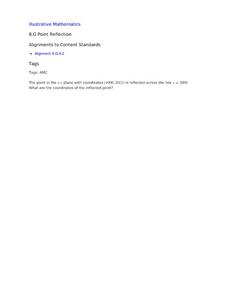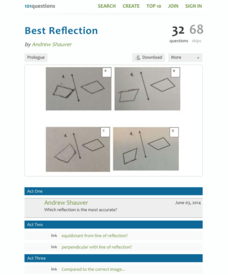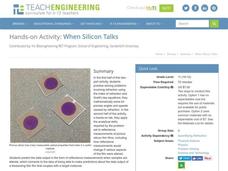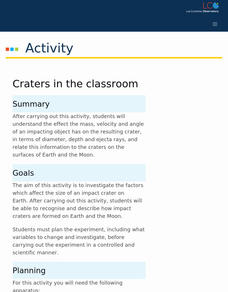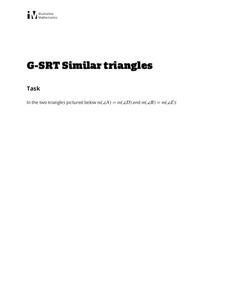Curated OER
Reflection and Refraction
Life is only a reflection of what we allow ourselves to see. The lesson includes three experiments on light reflection, light refraction, projection, lenses, and optical systems. Each experiment builds off the ones before and...
It's About Time
Reflected Light
The lesson allows young scientists to use lasers and mirrors to study reflected light. A reading passage and homework question assess learning, while additional material introduces extension activities.
Curated OER
Point Reflection
Use this task as an exit ticket for your eight graders during the geometry unit. All they need to do is identify the coordinates of a point reflected over y=2000.
Exploratorium
Laser Jello
The concepts of refraction and reflection gel with your physical science class during this colorful exploration. Shining lasers through Petri-dish-shaped gelatin desserts, they will notice how the light travels and bounces off the sides....
It's About Time
Refraction of Light
Don't shine like a diamond, refract light like a diamond. Young scientists use an acrylic block and a laser light to observe refraction. Advanced scholars figure the sine of the angles of reflection and incidence as well as mastering...
101 Questions
Best Reflection
Which is the best reflection of them all? Given four diagrams, pupils determine which one shows the most accurate reflection of a quadrilateral. Two images provide the distances of each vertex from the line of reflection, as well as the...
Illustrative Mathematics
Bank Shot
Young geometers become pool sharks in this analysis of the angles and lengths of a trick shot. By using angles of incidence and reflection to develop similar triangles, learners plan the exact placement of balls to make the shot....
Exploratorium
Corner Reflector
If you set up a triad of mirrors into a corner figuration, they act as a kaleidoscope, bouncing light waves back and forth indefinitely, changing the light that your eyes perceive. Although the materials required are very specific and...
Teach Engineering
When Silicon Talks
Explore Snell's Law using thin films. In the fifth installment of a seven-part series, pupils solve a set of problems relating to Snell's Law and use this skill during an experiment requiring the collection of reflective measurements...
Exploratorium
Polarized Sunglasses
Reflected waves of light move within a plane, and because of this, polarizing materials can reduce the glare our eyes see. This resource explains how to set up a demonstration of this effect. Consider it for use in your physical science...
Las Cumbres Observatory
Craters in the Classroom
Laws of motion apply both in space and on Earth. Young experimenters model object impact on the Earth and moon. They use data to determine the effect mass and velocity have on the resulting craters and how that relates to the energy of...
Curated OER
Why Does ASA Work?
Your geometry learners explore Angle-Side-Angle congruence in this collaborative task. The sum of the interior angles of all triangles being one hundred eighty degrees, is the key learners will discover as they explain their reasoning...
Curated OER
Why Does SAS Work?
Your geometry learners are guided by questions that help them use the language of reflections to explain the Side-Angle-Side congruence between two triangles in this collaborative task. Given a sample solution, declaring the...
Illustrative Mathematics
Similar Triangles
Proving triangles are similar is often an exercise in applying one of the many theorems young geometers memorize, like the AA similarity criteria. But proving that the criteria themselves are valid from basic principles is a great...
Illustrative Mathematics
Lines of Symmetry for Quadrilaterals
Explore how lines of symmetry help define different categories of quadrilaterals. Looking at a square, rectangle, trapezoid, and parallelogram, young mathematicians discover that each shape has its own, unique symmetry. Encourage your...
North American Montessori Center
Sun and Moon Autumnal Equinox Activities
Two hands-on activities celebrate the sun and moon autumnal equinox. First, scholars create a cairn using a shoebox, flashlight, and drawing tools to view the sun's progression. Second, learners take to the kitchen to bake mooncakes...
Teach Engineering
Concentrating on the Sun with PVs
Concentrate to determine the best reflector design. Pairs use the engineering design process to build a reflector to increase the current output of a photovotaic panel. Teams arrive at a final design and present it to the class along...
Education Development Center
Proof with Parallelogram Vertices
Geometric figures are perfect to use for proofs. Scholars prove conjectures about whether given points lie on a triangle and about midpoints. They use a provided dialogue among fictional students to frame their responses.
US Department of Energy
Solar Cooking
Who needs a barbecue grill to cook hot dogs when you have the amazing power of the sun at your disposal? Engage young scientists in learning about solar energy with this fun activity that turns a used Pringles can into a solar...
Exploratorium
Cheshire Cat
Divide your field of vision in two and see what happens when your two eyes behold two different scenes! This is a way to demonstrate to body-systems buffs how the two eyes usually blend pictures to create a three-dimensional view. This...
Curated OER
Using Vegetation, Precipitation, and Surface Temperature to Study Climate Zones
Using NASA's Live Access Server, earth scientists compare the temperature, precipitation, and normalized difference vegetation index for four different locations. They use the data to identify the climate zone of each location using...
Exploratorium
Exploratorium: Critical Angle
Students can see light reflected and refracted in this demonstration. They will also discover the total internal reflection of light.
Optical Society
Optical Society of America: Optics for Kids: Mirror, Mirror on the Wall
A simple experiment that clearly demonstrates angles of reflection when light hits a mirror. Accompanied by a good explanation of what's happening, and a link to an article on reflection.
My Science Site
Reflection Experiments [Pdf]
Looking for some hands-on activities to use with your students to teach reflection? This resource offers a couple of experiments on the angle of reflection and light absorption. This resource is in PDF form; requires Adobe Reader.


